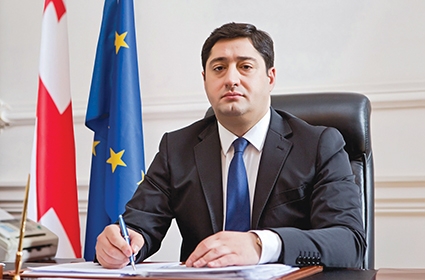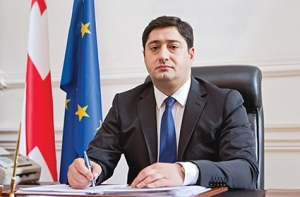Preserving Democracy: the On-Going Fight between the Court and the Government
The relationship between the Constitutional Court and the Government became strained after the 2013 case concerning the Broadcasting Law when the Constitutional Court nullified the norm, according to which the Broadcasting Board would automatically change with the change in the adoption of the law. The situation turned into a physical confrontation and reached its culmination in September 2015, after the Gigi Ugulava (former Mayor of Tbilisi) case when the court limited 9-months pre-trial detention. From then to date the two bodies have been rivals. GEORGIA TODAY spoke to the President of the Constitutional Court, George Papuashvili, on that relationship and the perspectives of future collaboration between the two.
When did the relationship worsen between the Constitutional Court and the Government?
The Constitutional Court, which has been functioning for 20 years, is recognized by Georgian and international experts, governmental and non-authoritative organizations as an impartial, highly trusted body which stands out in the region. Unlike other institutions, you can find no independent qualified opinion that would question the authority and neutrality of the Constitutional Court. A perfect example of this is election of Georgia Constitutional Court as a chairman of the Conference of European Constitutional Courts in 2012. So, the Constitutional Court, and I, as a chairman of the Constitutional Court, represent all European Constitutional Courts and their equivalent bodies for a 4-year term.
Prior to the 2012 election, a lot of important cases were heard in the court and many members of today’s majority participated and cases often ended with the victory of the applicant. There were three cases concerning illicit listening and internet surveillance. Others included rallies and demonstrations legislation, when a 20 meter limitation around state buildings was canceled, important provision to ensure freedom of expression, and the abolition of the obligation of a license for cable TV.
The same tendency continued after, however, in this case politicians were actively involved from all sides and the court underwent a political turmoil. Unfortunately, this was followed by various attacks that I would call ‘hybrid attack’ on the Court - directly or indirectly the government carries out attacks against the Court.
The first dissatisfaction of the government came in 2013 regarding the Public Broadcasting Law when the Constitutional Court nullified the norm. The Constitutional Court said that regardless of changes of government, if there is no radical change in broadcast structure, the pre-time removal of members of the board shall not be allowed. The change of every government coming with a change in Public broadcasting board affects the broadcasting policy, which is not correct. In addition to the majority members’ criticism, the first physical confrontation occurred in Batumi when a small gathered group attempted to block a Court vehicle and threw various items at the building. We made a statement, which unfortunately was not responded to by law enforcement and government. As the incident was small, we didn’t follow up on it. But the situation became extremely tense when the Court’s restricted 9-month pre-trial detention after the so-called ‘Ugulava Case’ in September, 2015.
Rallies, shooting of various subjects, and threatening statements were made in front of various judges’ houses in Batumi and Tbilisi. Law enforcement officers did not react. In reality, the government did not prevent unlawful activities and to fulfill its obligations to provide the Constitutional Court and its members with security – they even contributed to the attacks. Some members of parliament tried to legitimize the law breaking by labeling the incidents ‘freedom of speech.’ Though, many international and non-governmental organizations reacted, and the situation was relatively neutralized.
You stated that before the Ugulava Case, Minister of Justice Tea Tsulukiani offered cooperation with the government. What was that cooperation?
In September 2015, Ms Tsulukiani told me that if the entire Constitutional Court and I would collaborate closely with the government, she would help me on behalf of the Government for the term extension at the Venice Commission and would solve other life problems. I refused her offer and decided not to make it public then as it would further complicate our relations with the government and encourage the political games.
What can you say about the planned legislative changes pertaining to the Court?
After the Rustavi2 case, the Minister of Justice stated that the Court is biased and the legislative changes for Court reforms should begin. This happened in December and they have only recently published the draft which until now was secret. The project has been seen by neither Georgian experts nor the Venice Commission and now they want to adopt it urgently in Parliament. The draft basically aims to restrict the powers of the Court.
You are protesting the Commission created to send a candidate to Strasbourg, why?
A so-called Commission was created which will choose 5 candidates here, three of whom will be elected and sent to Strasbourg Court of Human Rights to represent the government- and there one will be selected. That Commission is composed mostly of government representatives. The president of the Commission is the Minister of Justice and members are the Government Parliamentary Secretary, Deputy Foreign Minister, and Deputy Chief Prosecutor, majority members of parliament and, in addition, several non-governmental organizations and academia representatives for the entourage.
If you create a proper, unbiased commission, you should not put government representatives but experts in the field. There were many procedural infringements; all candidate biographical data and interview results should be public but they published only my results. Conflict of interest provisions were not taken into account; there are no results appeal mechanisms.
I was disliked due to a political mark as being unacceptable for the government. The President of the Conditional Court should not be on the list.
They would have troubles regarding criticizing my competence. Apart from my previous activities in the legal field and current academic work, I have been the President of the Constitutional Court for 10 years. I had been member of the Venice Committee for 8 years, and still remain a visiting expert. At the same time I was elected as the Chairman of the Conference of European Constitutional Courts. Therefore, there was a high probability that the European Council would elect me if I was one of the candidates- something which would be categorically unacceptable for the government, so instead of valuing the competence I have, they decided that I was unsuitable in terms of moral criteria.
When I publicly criticized the work of the Commission and published relevant documents in response to the moral criticism, the Minister of Justice of the time insisted on unofficially publishing photo-video material of me swearing in order with the aim of revealing my ‘immoral’ character.
As I know, the publicizing of such recordings was met with resistance within the government circle and after I revealed this publicly, I hope it won’t be released- if it is, the source will be clear.
What are your expectations for future relations between the Court the government?
I say again that a hybrid attack is being launched against the Court by the government’s curtain bodies and representatives and we are facing complete inaction to counter it, particularly from the law-enforcement side. Additionally, there is an attempt to defame the Court and its members. A new tactical attack began with the adoption of legislative changes in order to restrict the Court from functioning effectively. The worst thing is that it damages not only the constitutional Court but the prestige of the country, too. The President of the Venice Commission has already made a statement about ours and the government’s relationship. The same Commission again made recently a statement on behalf of the whole Commission. Council of Europe Human Rights Commissioner Nils Muižnieks also made a statement. Then, in the European Parliament’s resolution of this January, inadmissibility of pressure on the Constitutional Court was mentioned.
This situation threatens our country’s democracy- the Constitutional Court is a vital and powerful institution in all countries even if politicians don’t like it. When three judges and I end our terms in six months’ time, we want to leave a legacy that will ensure that this body is recognized, respected, and untouched by the government.
Meri Taliashvili












